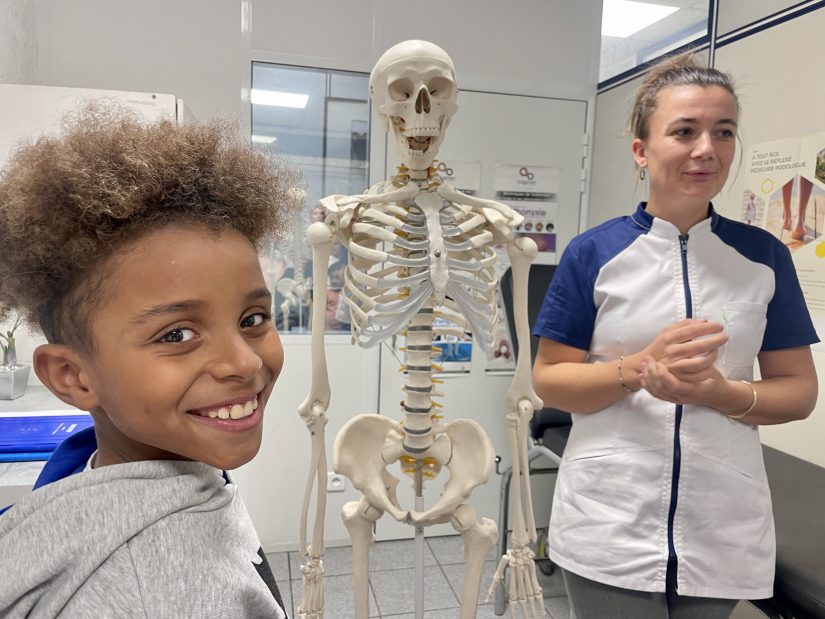In Athens, Bethlehem, and Marseille, innovative pedagogies reconnect children to nature, culture, and their city. Forests, music, and encounters become learning tools. These wall-less schools, attuned to the environment and social realities, outline a different way of learning: grounded in reality, collective, and future-oriented. An education that is rooted, creative, and restorative.
This article, on education, is a summary of 3 articles published in 22-med, available in the 11 languages used on the site.
Children find hope through music: Monjed Jadou - Palestine
A school that reconnects children to nature: Kelly Fanarioti - Greece
With "Quartier École", students discover the trades of their neighbors: Marie Le Marois - France
School is not always a classroom. In some corners of the Mediterranean, it is reinvented elsewhere: at the foot of the pines, in a cultural center, or in the streets of a neighborhood. Teachers are rethinking the places and methods of learning to rekindle children's taste for discovery, speech, and connection.
In Greece, the school of pines
In the forest of Dionysos, the students of the kindergarten "Pefkites" start their day by picking the organic fruits they have planted. Then they walk among the trees, observe the curves of the branches, listen to the rustling of the wind, and count the shades of green. At noon, they have lunch under the plane trees. "We build huts, climb trees, and laugh in the fallen leaves," says Manolis, 5 years old. Here, there are no desks, but sand, wood, and water. And a chestnut fire if the season allows.
Vasiliki Kampilakou, an educator, started this school in 2005 after a trip to Sweden. "I wanted a place for my daughter, a space where she could move, breathe, and create." The school operates under the auspices of the Ministry of Education, but the program deviates radically from the standards. The signs installed in the forest do not give disciplinary instructions, but poetic ones: "Lie down, look at the sky, what do you see?"
Far from any folklore, this school develops concrete skills: motor skills, mutual aid, sensory expression, orientation. "Children learn to cross streams, to solve problems together, to narrate what they experience. They become attentive to the world." Kampilakou insists: "They don’t need a tablet to explore. The real world is vast enough."
In Bethlehem, the school of sounds
"Music has taught me to express what I feel, even when I am afraid." For Sarah Hwamdeh, 11 years old, traditional Palestinian songs are more than a heritage: they are living roots. She attends the Grass center, a place where 45 children aged 6 to 16 take singing and instrument lessons twice a week.

Created by the Arab Rehabilitation Society and supported by Musicians Without Borders, this program combines musical training with psychosocial support. Each child undergoes a social assessment. Then, in small groups, they learn to play the oud, violin, or qanun (specify what oud and qanun look like). Meanwhile, workshops are led by social workers. They discuss bullying, anger, and loneliness.
Adam Rahal, also 11 years old, shares: "I am calmer now. I know how to speak better to others. And I discovered that I love sharing our songs with younger children." He feels useful, invested. "We formed a musical group. The center is our second home."
Abeer Sansour, a musician and singing teacher, guides the children with kindness: "We work like a family. When a child sings, they are telling their story." She notes visible changes: calmer behavior, renewed attention, curiosity. The learning does not aim for virtuosity, but for self-expression.
France: learning from neighbors
In the working-class neighborhood of Belle de Mai in Marseille, the students of Bernard Cadenat school attend class… at the podiatrist's office, at the cinema, or at the grocer's. Since November 2023, the "Quartier École" initiative, imagined by La Fabrique du Nous, offers three pilot classes the opportunity to learn outside the walls. Doctors, shopkeepers, gardeners, and cleaning agents become teachers for a day.
That morning, about ten children are welcomed in the neighboring podiatry office. In front of them is Oscar, a plastic skeleton. The podiatrist talks to them about joints, muscles, and areas of the foot. "This is the belly of the foot," says a little girl, pointing to the sole. Mathilde Adam, a teacher, responds: "Yes, and the hollow is the arch." Isaac, a fifth-grade student, points to the ribs. Kemis is surprised: "I didn't know there were so many." They finish with a foot imprint on the podograph – a souvenir to take home.
In this neighborhood marked by precariousness, "Quartier École" transforms the city into a learning ground. Math and history are discovered elsewhere: at the cinema Le Gyptis, the children discuss World War II – the building having been bombed in 1944 – and do geometry calculations around the screen. In the garden of the Couvent Levat, a previously very withdrawn Romanian student transforms: she knows the weeding gestures and shares her knowledge. "She was no longer the same child," recalls Christelle Ribes, a volunteer project leader.
They will soon go to the municipal archives to learn how to read a map, discover manuscripts, and get introduced to calligraphy. Then to a cooperative grocery store, to talk grams, kilos, and do calculations at the checkout.
A school in connection
Whether it is rooted in a forest, elevated in song, or invented on the corner of the street, alternative schools exist. They heal, connect, reveal. They do not deny the world's difficulties but propose to face them with more presence, cooperation, and attention to the living.
These educational projects share a common intuition: learning is not limited to programs. It is also a matter of places, relationships, and emotions. A school that listens, welcomes, and liberates.

Cover Photo: In the forest of Dionysos, the students of the kindergarten "Pefkites" discover nature © DR
Indexing: Library of Mediterranean Knowledge
